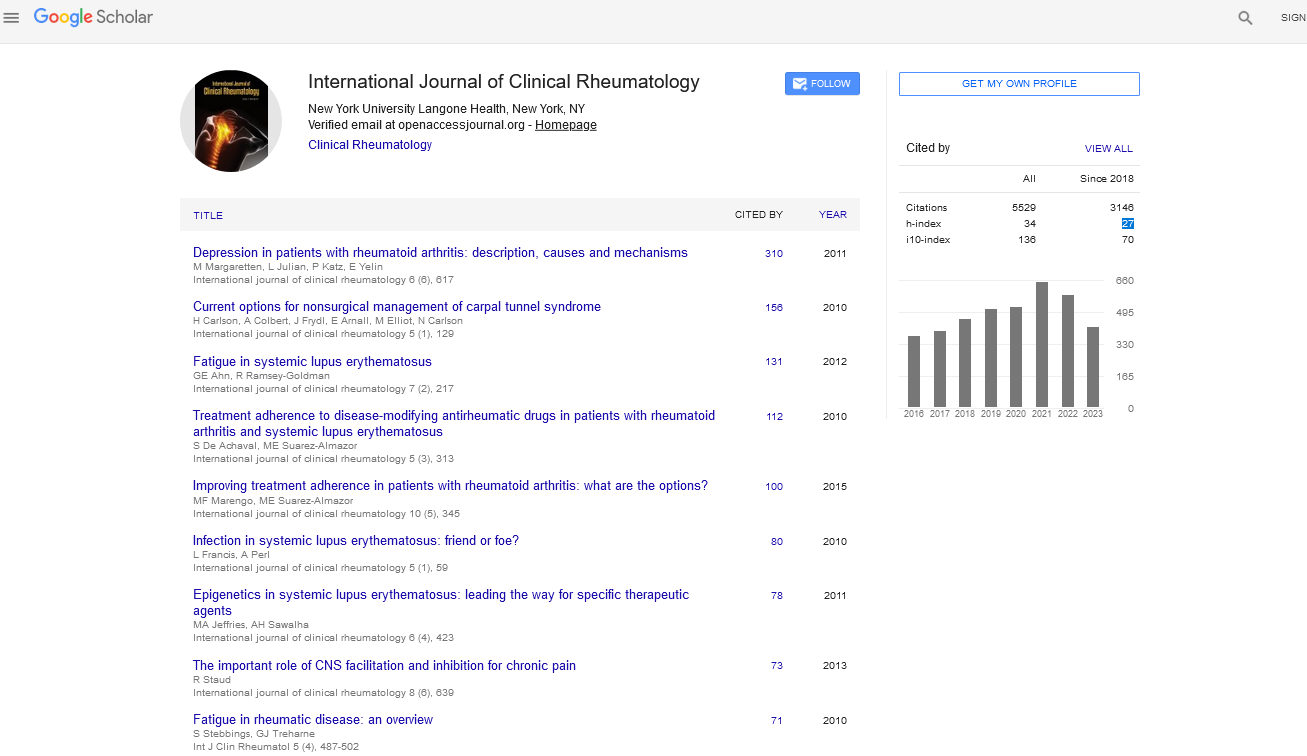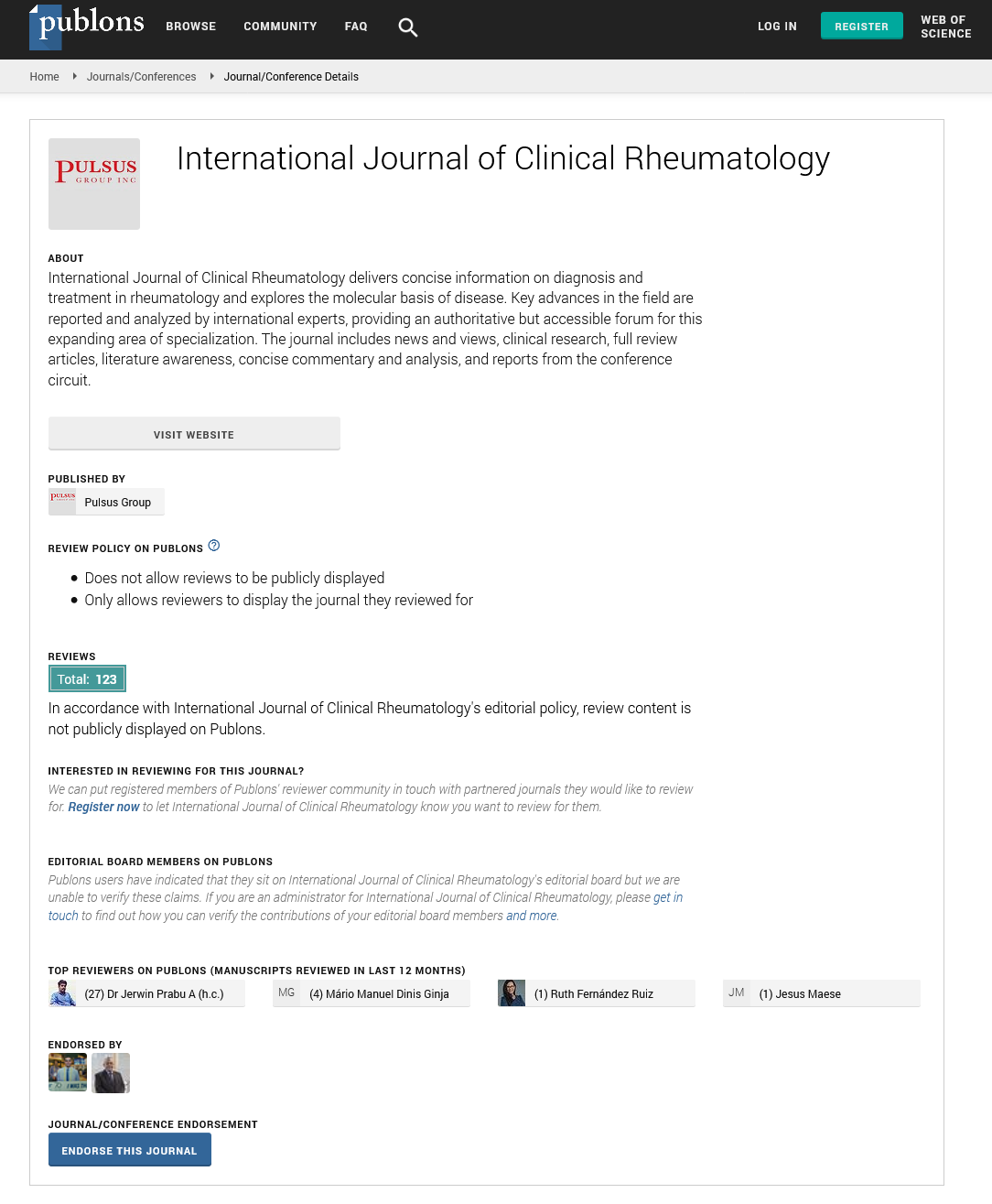Case Report - International Journal of Clinical Rheumatology (2021) Volume 16, Issue 5
Successful switching to Infliximab after systemic allergic reaction to Adalimumab drug: a case report
- *Corresponding Author:
- Alireza Sadeghi
Isfahan University of Medical Sciences, Isfahan, Iran
E-mail: drsadeghialireza@gmail.com
Abstract
Subjective: To describe a case of systemic allergic reaction to Adalimumab drug in an Ankylosing Spondylitis (AS) patient and switching to Infliximab.
Case report: A 43-year-old middleeastern man with a history of AS who was initiated with the treatment of Adalimumab. After the second injection of the drug immediate systemic allergic reaction with the symptoms of dizziness, shortness of the breath, angioedema of the limps and generalized rashes and itching happened.
Discussion: Systemic reactions to Adalimumab although rare have been reported before. In case of allergic reaction to this drug desensitization and switching to another anti-TNFα have been successfully tried.
Keywords
adalimumab • infliximab • allergic reaction
Introduction
Adalimumab is a fully human monoclonal antibody specific for human Tumor Necrosis Factor α (TNFα) and is used to treat inflammatory diseases such as rheumatoid arthritis, psoriatic arthritis, juvenile idiopathic arthritis, plaque psoriasis, Crohn’s disease, uveitis and Ankylosing Spondylitis (AS). [1] Ankylosing spondylitis is a chronic inflammatory disease that affects the sacroiliac joints, spine, peripheral joints, and enthuses. [2] Adalimumab is recommended to be subcutaneously injected once every two weeks with the dose of 40 mg/kg. [3] The most common adverse reaction to Adalimumab is injection site hypersensitivity which occurs in 6.6% to 15.3% of patients. These reactions usually appear at the sight of injection as erythematous, edematous and itching patches that appear between 1h to 24 h after injection, peak after 48 hof injection and usually last for 3 daysto 5 days. Injection site reactions normally fade over time after multiple injections. [4] Although local hypersensitivity reactions such as injection site reactions are common, generalized hypersensitivity reactions to Adalimumab although occasionally reported, rarely happen. Few cases of generalized hypersensitivity reactions have been reported, [5-9] two of which have performed a skin-prick test with positive results. [10,11]
This study aims to describe another generalized hypersensitivity reaction due to injection of Adalimumab.
Case presentation
This paper presents a 43-year-old Middle Eastern man with a history of AS.He did not smoke or drink and had no previous history of drug of food allergies. After inadequate response to 2 different NSAIDs, Adalimumab was started for this patient. Adalimumab was initiated with 40 mg/kg every 2 weeks and was injected subcutaneously. Patient was referred to a trained nurse and learned how to inject the drug at home. Adalimumab was used under the brand name of Cinora, made by the pharmaceutical company Orchid pharmed. Half an hour after the second injection of Adalimumab patient was admitted in the emergency room with dizziness, shortness of the breath, angioedema of the limps and generalized rashes and itching. Within one hour after injection of intravenous corticosteroids and anti-histamines complete recovery was maintained. Serum- Specific IgE was checked for this patient with negative results. Adalimumab drug was withheld for two month and treatment was replaced by Infliximab thereafter. The patient tolerated the Infliximab and didn’t experience any signs or symptoms of general or local hypersensitivity.
Discussion
This case repost demonstrates a case of severe systemic allergic reaction shortly after injection of an anti-TNFα agent, Adalimumab. Systemic allergic reactions although rare, can be life threatening and are at a high level of importance. The studies of Hansel K, et al, Quersia O, et al, Steenholdt C, et al, Adamiak T, et al, Rodríguez- Jiménez B, et al, Benucci M, et al and Sànchez-Cano D, et al [5-11]have reported cases of systemic allergic reaction to Adalimumab. In the study of Rodríguez- Jiménez B, et al [11] skin-prick test was performed with positive results. In the study of Benucci M, et al [10] positive skin tests and negative serum-specific IgE in a case of immediate systemic reaction to Adalimumab was reported. The results on IgE antibodies in the case mentioned in this study is similar to this case.Positive skin tests in the mentioned studies suggest an immunologic mechanism is involved in these reactions;however the serum-specific IgE seems to not be responsible for this adverse reaction and the exact type of the antibody involved in this reactions remains unknown.
Systemic allergic reactions as discussed before are rare but potentially fatal, and thus it is important to take the right approach.Previous studies such as the study of Quercia O, et al, Stallmach A, et al, Takase K and Manso L, et al show when hypersensitivity to one anti-TNFα agent occurs, successful switching to another anti-TNFα drug can happen. [6,12-14] Another approach would be desensitization to the drug in both local and systemic allergic reactions. Regarding systemic reactions to Adalimumab studies of Rodríguez-Jiménez B, et al, Thévenot J, et al and Bavbek S, et al suggest hypersensitivity to Adalimumab can resolve by desensitization. [11,15,16] As mentioned above, Although localized allergic reactions to TNF-α inhibitors are common, severe systemic reactions such as in this case are rare, and among few cases reported, in only one other study serum-specific IgE has been tested and reported negative before.
Conclusion
In the case mentioned in this study, the proximity of the allergic reaction to the administration of the drug and the previous case reports documenting other systemic allergic reaction to Adalimumab are highly suggestive of the association of the two. Switching to another anti-TNFα drug has been successful in this case and can be suggestive of a long-term solution for patients developing this adverse reaction to the drug.
References
- Weinblatt ME, Keystone EC, Furst DE et al. Adalimumab, a fully human anti-tumor necrosis factor alpha monoclonal antibody, for the treatment of rheumatoid arthritis in patients taking concomitant methotrexate: the ARMADA trial. Arthritis. Rheum. 48(1), 35–45 (2003).
- Lehtinen K. Mortality and causes of death in 398 patients admitted to hospital with ankylosing spondylitis. Ann. Rheum. Dis. 52(3), 174–176 (1993).
- Mease PJ, Gladman DD, Ritchlin CT et al. Adalimumab for the treatment of patients with moderately to severely active psoriatic arthritis: results of a double-blind, randomized, placebo-controlled trial. Arthritis. Rheum. 52(10), 3279–3289 (2005).
- Ho GT, Mowat A, Potts L et al. Efficacy and complications of adalimumab treatment for medically-refractory Crohn's disease: analysis of nationwide experience in Scotland (2004-2008). Aliment. Pharmacol. Ther. 29(5), 527–534 (2009).
- Hansel K, Bianchi L, Tramontana M et al. Immediate local and systemic hypersensitivity due to etanercept and adalimumab. J. Allergy. Clin. Immunol. Pract. 7(2), 726–727 (2019).
- Quercia O, Emiliani F, Foschi FG et al. Adalimumab desensitization after anaphylactic reaction. Ann. Allergy. Asthma. Immunol. 106(6), 547–548 (2011).
- Steenholdt C, Svenson M, Bendtzen K et al. Acute and delayed hypersensitivity reactions to infliximab and adalimumab in a patient with Crohn's disease. J. Crohns. Colitis.6(1), 108–111 (2012).
- Adamiak T, Stephens M, Werlin SL. Angioedema occurring in pediatric patients with Crohn disease treated with adalimumab. J. Pediatr. Gastroenterol. Nutr. 51(2), 223–225 (2010).
- Sànchez-Cano D, Callejas-Rubio JL, Ortego-Centeno N et al.Urticaria and angioedema in a patient with Behçet's disease treated with adalimumab. Clin. Exp.Rheumatol.24(5 Suppl 42), S128 (2006).
- Benucci M, Manfredi M, Testi S et al. Spondylarthritis presenting with an allergic immediate systemic reaction to adalimumab in a woman: a case report. J. Med. Case. Rep.5, 155 (2011).
- Rodríguez-Jiménez B, Domínguez-Ortega J, González-Herrada C et al. Successful adalimumab desensitization after generalized urticaria and rhinitis. J. Investig. Allergol. Clin. Immunol.19(3), 246–247 (2009).
- Stallmach A, Giese T, Schmidt C et al. Severe anaphylactic reaction to infliximab: successful treatment with adalimumab - report of a case. Eur. J. Gastroenterol. Hepatol. 16(6), 627–630 (2004).
- Manso L, Polo B, Fernández-Nieto Met al.Basophil activation test in a case of systemic hypersensitivity reaction to infliximab with good tolerance to another anti-TNF-alpha agent (adalimumab). J. Investig. Allergol. Clin. Immunol.20(6), 537–538 (2010).
- Takase K, Ohno S, Ideguchi H et al. Successful switching to adalimumab in an infliximab-allergic patient with severe Behçet disease-related uveitis. Rheumatol. Int. 31(2), 243–235 (2011).
- Thévenot J, Ferrier le Bouëdec MC, Buisson A et al.Rapid Desensitization to Adalimumab Is Associated With Decreased Basophil Sensitivity. J. Investig. Allergol. Clin. Immunol. 29(2), 141–143 (2019).
- Bavbek S, Ataman Ş, Akıncı A et al. Rapid subcutaneous desensitization for the management of local and systemic hypersensitivity reactions to etanercept and adalimumab in 12 patients. J. Allergy. Clin. Immunol. Pract. 3(4), 629–632 (2015).


